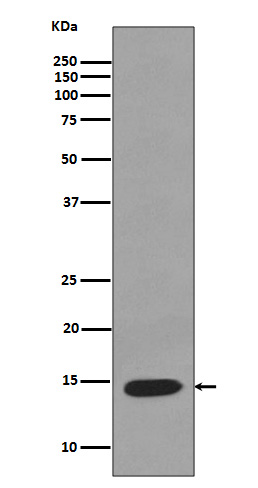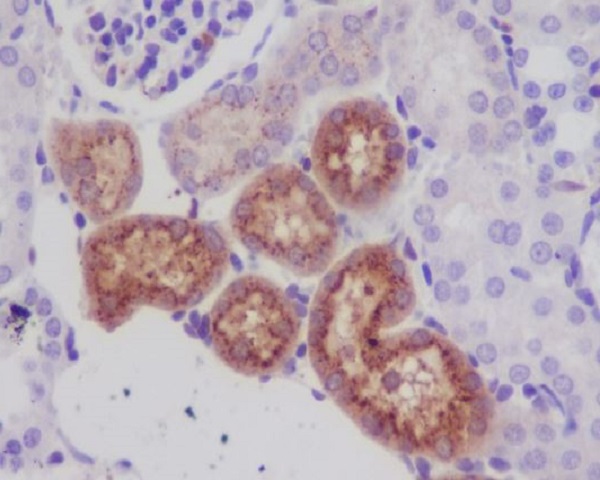

| WB | 咨询技术 | Human,Mouse,Rat |
| IF | 1/20 | Human,Mouse,Rat |
| IHC | 1/50-1/100 | Human,Mouse,Rat |
| ICC | 1/50-1/200 | Human,Mouse,Rat |
| FCM | 咨询技术 | Human,Mouse,Rat |
| Elisa | 咨询技术 | Human,Mouse,Rat |
| Aliases | LZM; LYZF1 |
| Entrez GeneID | 4069 |
| WB Predicted band size | Calculated MW: 17 kDa; Observed MW: 17 kDa |
| Host/Isotype | Rabbit IgG |
| Antibody Type | Primary antibody |
| Storage | Store at 4°C short term. Aliquot and store at -20°C long term. Avoid freeze/thaw cycles. |
| Species Reactivity | Human,Mouse |
| Immunogen | A synthesized peptide derived from human Lysozyme |
| Formulation | Purified antibody in PBS with 0.05% sodium azide. |
+ +
以下是关于溶菌酶(Lysozyme)抗体的3篇代表性文献摘要:
---
1. **文献名称**:*Production and characterization of monoclonal antibodies specific for hen egg lysozyme*
**作者**:Sakato, N., & Fujio, H.
**摘要**:该研究报道了针对鸡卵溶菌酶的单克隆抗体制备与表征。通过杂交瘤技术获得抗体,并验证其高亲和力(KD ≈10⁻⁹ M)及特异性。抗体在ELISA和免疫印迹中表现优异,为溶菌酶检测工具开发奠定基础。
---
2. **文献名称**:*Structural analysis of antibody-lysozyme complexes by X-ray crystallography*
**作者**:Amit, A.G., et al.
**摘要**:作者通过X射线晶体学解析了溶菌酶与其单克隆抗体(HyHEL-5)复合物的三维结构,揭示了抗原-抗体结合界面的关键氨基酸残基及相互作用,为理解抗体特异性识别机制提供结构依据。
---
3. **文献名称**:*Nanobodies targeting lysozyme: A novel tool for detecting amyloidosis-related aggregates*
**作者**:Dumoulin, M., et al.
**摘要**:研究开发了基于骆驼源纳米抗体(VHH)的溶菌酶特异性探针,成功检测病理条件下溶菌酶的异常聚集(如淀粉样变性)。该抗体体积小、稳定性高,适用于组织病理学诊断及分子成像。
---
这些文献涵盖抗体开发、结构解析及疾病应用方向,可供溶菌酶相关免疫研究参考。如需具体期刊信息或年份,可进一步补充检索。
Lysozyme antibodies are immunoglobulins specifically designed to recognize and bind to lysozyme, a small enzyme widely present in biological systems. Lysozyme, first identified by Alexander Fleming in 1921. is a glycoside hydrolase that cleaves bacterial cell walls by hydrolyzing β-1.4-glycosidic bonds. It is abundant in secretions like tears, saliva, and egg white, playing a critical role in innate immunity. Antibodies targeting lysozyme are valuable tools in research, diagnostics, and industrial applications.
In research, lysozyme antibodies are used to study protein structure-function relationships, immune responses, and enzyme kinetics. They are essential in techniques like Western blotting, ELISA, and immunohistochemistry to detect lysozyme in biological samples. Commercially, these antibodies aid in quality control for food and pharmaceutical industries, particularly in egg-based products. Clinically, lysozyme levels in bodily fluids serve as biomarkers for conditions like inflammatory diseases or certain cancers, making corresponding antibodies vital for diagnostic assays.
Lysozyme antibodies are typically generated in animals (e.g., rabbits, mice) through immunization with purified lysozyme, yielding polyclonal or monoclonal forms. Cross-reactivity studies are crucial, as lysozyme variants (e.g., human vs. chicken) exhibit structural differences. Recent advances in recombinant antibody technology have enhanced specificity and reduced batch variability. Despite their utility, challenges remain in minimizing non-specific binding and optimizing affinity for diverse applications. Overall, lysozyme antibodies remain indispensable in bridging basic science with practical uses in biotechnology and medicine.
×